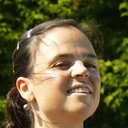Quercetin and epigallocatechin gallate inhibit glucose uptake and metabolism by breast cancer cells by an estrogen receptor-independent mechanism.
Ключови думи
Резюме
In this study we characterized (3)H-2-deoxy-d-glucose ((3)H -DG) uptake by the estrogen receptor (ER)-positive MCF7 and the ER-negative MDA-MB-231 human breast cancer cell lines and investigated the effect of quercetin (QUE) and epigallocatechin gallate (EGCG) upon (3)H-DG uptake, glucose metabolism and cell viability and proliferation. In both MCF7 and MDA-MB-231 cells (3)H-DG uptake was (a) time-dependent, (b) saturable with similar capacity (Vmax) and affinity (Km), (c) potently inhibited by cytochalasin B, an inhibitor of the facilitative glucose transporters (GLUT), (d) sodium-independent and (e) slightly insulin-stimulated. This suggests that (3)H-DG uptake by both cell types is mediated by members of the GLUT family, including the insulin-responsive GLUT4 or GLUT12, while being independent of the sodium-dependent glucose transporter (SGLT1). QUE and EGCG markedly and concentration-dependently inhibited (3)H-DG uptake by MCF7 and by MDA-MB-231 cells, and both compounds blocked lactate production by MCF7 cells. Additionally, a 4h-treatment with QUE or EGCG decreased MCF7 cell viability and proliferation, an effect that was more potent when glucose was available in the extracellular medium. Our results implicate QUE and EGCG as metabolic antagonists in breast cancer cells, independently of estrogen signalling, and suggest that these flavonoids could serve as therapeutic agents/adjuvants even for ER-negative breast tumors.




